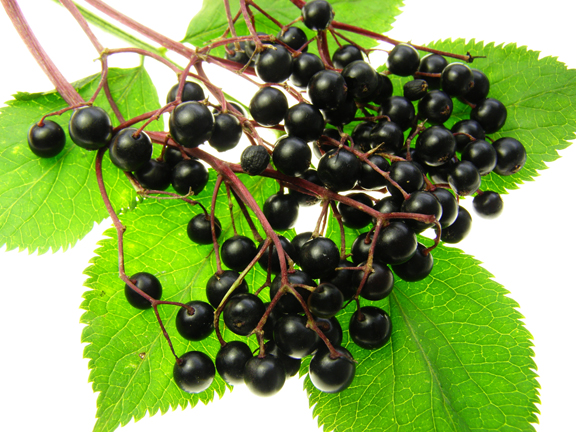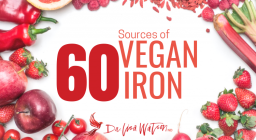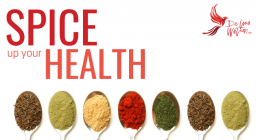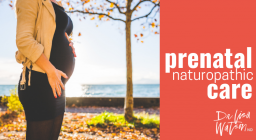
Elderberry has been getting a lot of respect in the media in recent years, but it has long been revered by Naturopathic Doctors and herbalists as a potent immune booster and medicine for the prevention and treatment of influenza.
What is Elderberry?

Elderberry, or Sambucus nigra is one species of elder that is grown primarily in Europe and western Asia. It is a shrub or small tree that has small black berries. The leaves, twigs, branches, seeds, roots and unripe berries are toxic due to the presence of a cyanogenic glycoside. The ripe berries are safe to eat (once cooked) and are used to make syrups, liquors and medicines.
Elderberry and Influenza
Multiple studies have been published in the past decade that support the use of elderberry to prevent the flu, treat symptoms of the flu and to decrease duration and severity of the flu.
A study published in the scientific journal, Phytochemistry (2009 Jul;70(10):1255-61) compared elderberry to Tamiflu (Oseltamivir) and Amantadine – two pharmaceutical drugs used in the treatment of influenza, including H1N1 (“swine flu”). The researchers found that elderberry inhibited H1N1 infection in people by binding to H1N1, blocking the entry of the virus into cells and preventing infection.
An older study published in the Journal of Alternative and Complementary Medicine compared the use of elderberry to placebo and found that elderberry decreased the symptoms of influenza (including fever) within 2 days and achieved a cure of influenza in 2 days in 90% of the group receiving elderberry, compared to 6 days with placebo. The most interesting thing about this study is that it was looking at Influenza type B – a type of influenza that Tamiflu and Amantadine are not effective in treating.
Elderberry has other distinct advantages over Tamiflu and Amantadine. The use of prescription Tamiflu and Amantadine is limited by the potential for side effects. Common side effects of these drugs include insomnia, restlessness and anxiety. No side effects of medicinal elderberry have been reported in clinical studies in adults and children.*
*Consumption of raw and unripe berries, seeds, and other plant parts can cause nausea, vomiting or severe diarrhea.
How to Use Elderberry for Influenza
The best way for most people to take elderberry is in a syrup form. The syrup that I recommend is Sambucol. Dosage is individualized based on age and severity of symptoms (whether it is used for prevention or treatment of influenza).
Start Sambucol within 12-24 hours of onset of symptoms for fastest results. It is unclear whether elderberry is safe in pregnancy. Discuss with your Naturopathic Doctor whether you should use elderberry during pregnancy and breastfeeding.
Other Treatments for Influenza
There are a number of natural treatments for influenza. Bed rest, warming socks, vitamin D, vitamin C, zinc, Echinacea, Ginseng, Andrographis, Astragalus, Goldenseal, Larch arabinogalactans, homeopathic belladonna and eupatorium, and other natural therapies all have been used successfully in the management of influenza symptoms and may be combined with Elderberry in certain situations.
The best advice if you are feeling the first signs of the flu (fever, aches, chills, fatigue, headache, coughing and sore throat)is to rest, take Elderberry and consult with a Naturopathic Doctor for individualized advice.
Disclaimer
The advice provided in this article is for informational purposes only. It is meant to augment and not replace consultation with a licensed health care provider. Consultation with a Naturopathic Doctor or other primary care provider is recommended for anyone suffering from a health problem.
Resources
Barak V, Halperin T, Kalickman I. The effect of Sambucol, a black elderberry-based, natural product, on the production of human cytokines: I. Inflammatory cytokines. Eur Cytokine Netw. 2001 Apr-Jun;12(2):290-6.
Natural Medicines Comprehensive Database. Elderberry monograph. Accessed November 5, 2010. http://naturaldatabase.therapeuticresearch.com/home.aspx?cs=&s=ND
Roschek B Jr, Fink RC, McMichael MD, Li D, Alberte RS. Elderberry flavonoids bind to and prevent H1N1 infection in vitro. Phytochemistry 2009 Jul; Vol 70(10): 1255-61.
Shokrzadeh M, Saeedi Saravi SS. The chemistry, pharmacology and clinical properties of Sambucus ebulus: A review. J Medicinal Plants Res Jan 2010; Vol 4(2): 95-103.
Zakay-Rones Z, Varsano N, Zlotnik M, Manor O, Regev L, Schlesigner M, Mumcuolgu M. Inhibition of several strains of influenza virus in vitro and reduction of symptoms by an elderberry extract (Sambucus nigra L.) during an outbreak of influenza B Panama. J Altern Complement Med. 1995 Winter;1(4):361-9.
Zakay-Rones Z, Thom E, Wollan T, Wadstein J. Randomized study of the efficacy and safety of oral elderberry extract in the treatment of influenza A and B virus infections. J Int Med Res. 2004 Mar-Apr;32(2):132-40.

















[…] Here is the original: Elderberry – the Flu Fighting Fruit | Dr. Lisa Watson […]
[…] This post was mentioned on Twitter by Sambucol USA, Lisa Watson ND. Lisa Watson ND said: Fighting influenza? Consider Elderberry – the Flu Fighting Fruit (and a component of the 360 Flu 911 kit!!) – http://bit.ly/bqGLsx […]
Great information! I’ve been looking for something like this for a while now. Thanks!
Very interesting. My parents used to give me elderberry juice made from a concentrated syrup when I was sick as a child. As a warm beverage, I remember it settling my stomach and helping me get to sleep. Plus it’s delicious. Apparently it’s a traditional medicine in Denmark as it grows wild there. Unfortunately, we had a hard time growing it here in Canada. It’s interesting to find out more about how it actually works medicinally. I wonder, what component of the elderberry binds with the H1N1, and how were they actually able to discover this?
[…] are a number of well-studied botanical medicines available that can improve your immune function. Elder berries, andrographis, echinacea, goldenseal, astragalus, licorice, eucalyptus, garlic, ginger and ginseng […]
[…] you wondering what Elderberry is? What it does? Read more about it by clicking here. For all of those out there suffering this cold and flu season, get to the store and buy this. […]
[…] Photo credits here, along with another informative article on flu-fighting elderberry studies. […]
[…] that are fantastic for boosting your child’s immune system at the first sign of sickness. Elderberry, vitamin C, Echinacea, goldenseal, astragalus – and many other – options are available through […]
[…] that are fantastic for boosting your child’s immune system at the first sign of sickness. Elderberry, vitamin C, Echinacea, goldenseal, astragalus – and many other – options are available through […]